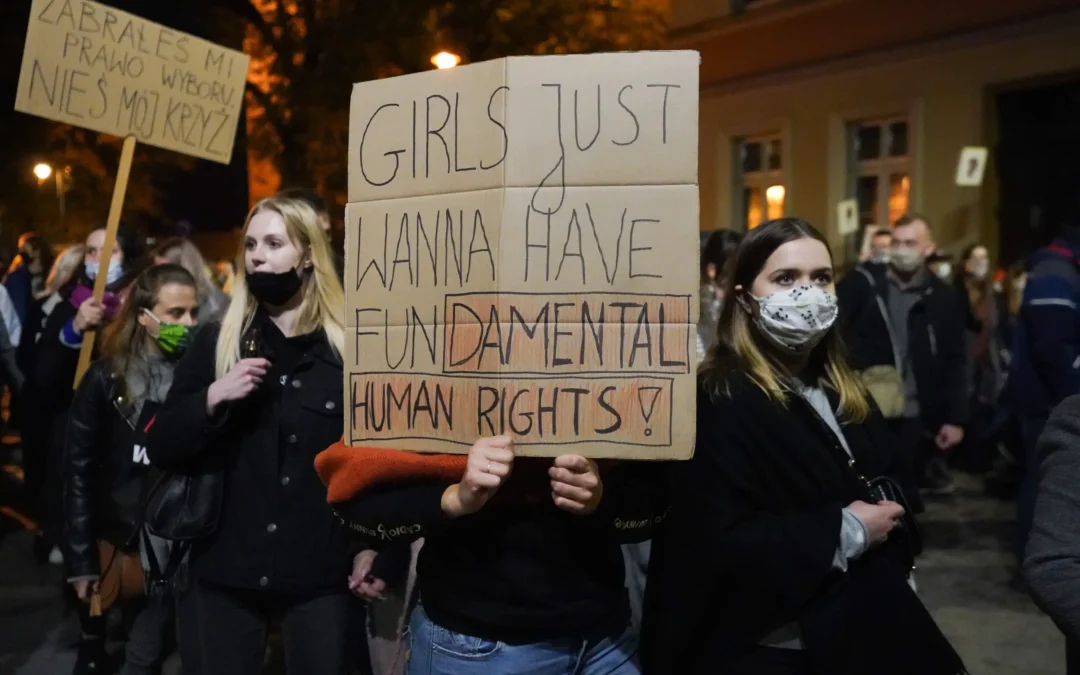Poland’s near-total ban on abortion violated the rights of a woman who had to travel abroad to terminate her foetus, which had been diagnosed with Down syndrome, the European Court of Human Rights has ruled.
It issued the ruling on the basis that three of the judges involved in issuing the 2020 Constitution Tribunal (TK) ruling that toughened the abortion law were appointed in an illegitimate manner by the former Law and Justice (PiS) government and President Andrzej Duda.
Judgment M.L. v. Poland – woman forced to travel abroad to have an abortion following legislative amendments breached the Convention https://t.co/KgxMiNE9C1#ECHR #CEDH #ECHRpress pic.twitter.com/VExdZ4fTh0
— ECHR CEDH (@ECHR_CEDH) December 14, 2023
The case in question was brought by a woman, named only as M.L., from Warsaw who had become pregnant in 2020 but whose foetus had at 14 weeks been diagnosed with trisomy 21, better known as Down syndrome.
She had been scheduled to have an abortion on 28 January 2021. That would have been legal under the pre-existing law, which allowed terminations in three cases: if pregnancy threatened a mother’s life or health; if it resulted from a criminal act (such as rape); or if the foetus was diagnosed with a severe birth defect.
However, on 27 January 2021, the TK ruling (which had been issued the previous October) went into force. It banned abortions due to birth defects, which had previously made up around 98% of all legal terminations in Poland.
Mass protests returned to the streets of Poland today after the government moved to finally bring into force last year's constitutional court ruling that would introduce a near-total ban on abortion https://t.co/vKAZB9azTi
— Notes from Poland 🇵🇱 (@notesfrompoland) January 27, 2021
As a result, M.L. was informed that, under the amended law, she could not have an abortion at the hospital in Warsaw as planned, nor anywhere else in Poland. As a result, she travelled to the Netherlands, where her pregnancy was terminated at a private clinic on 29 January.
M.L. then took the issue to the ECHR, arguing that her rights had been violated under articles 3 (prohibition of inhuman and degrading treatment) and 8 (right to respect for private and family life) of the European Convention on Human Rights.
In a ruling issued today, the ECHR announced that, while M.L.’s case did not meet the threshold to qualify for article 3, her rights had been violated under article 8.
Women now required to give birth to foetuses with fatal defects should be given a "personal room" with the "chance to have a cry", proposes the justice ministry as part of a support package put forward in response to Poland's new near-total abortion ban https://t.co/Tky0qV8j6N
— Notes from Poland 🇵🇱 (@notesfrompoland) February 3, 2021
“Any interference with Article 8 rights has to come from a body which was itself ‘lawful’, without which it would lack the legitimacy required in a democratic society,” wrote the court. However, Poland’s Constitutional Tribunal lacked that legitimacy, it noted.
That is because, as the ECHR has previously found, there were “serious irregularities” in the election of three of its judges in 2015 under the then-new PiS government and President Duda, who had appointed them instead of three judges legally nominated under the previous government.
One of those three judges was involved in issuing the TK’s abortion ruling. Two further judges in that ruling were replacements for the other two illegitimately elected judges (who had passed away in the meantime).
The ECHR “therefore found that the interference with the applicant’s rights had not been lawful in terms of Article 8 of the Convention because it had not been issued by a body compatible with the rule of law requirements…creating a situation depriving her of proper safeguards against arbitrariness”.
It ordered Poland to pay W.L. €16,004 in pecuniary and non-pecuniary damages. Poland can appeal against the judgement if it wishes.
Poland’s prime minister has admitted it was a “mistake” for the ruling party to push for the constitutional court to introduce a near-total abortion ban in 2020.
He claims “he has always been a supporter” of the abortion law that existed before the ruling https://t.co/QObza3Raxk
— Notes from Poland 🇵🇱 (@notesfrompoland) November 6, 2023
The 2020 abortion ruling by the TK triggered the largest protests Poland has seen since the fall of communism. Its unpopularity was widely seen as one of the major factors in PiS losing its parliamentary majority at elections in October this year.
PiS Prime Minister Mateusz Morawiecki admitted that pushing for the TK abortion ruling had been a “mistake”. His government was this week replaced by a new, more liberal administration led by Donald Tusk.
The new government has pledged to reverse the TK ruling, which would return the abortion law to the pre-2021 status quo. It has said that it can do so by declaring the ruling void because it was issued with the involvement of illegitimate judges.
However, the various parties that make up the new coalition disagree on whether there should also be further liberalisation of the law. Any such move could also be vetoed by Duda, who remains in office until 2025, or overturned by the TK, all of whose current judges were appointed under PiS.
One member of Poland's likely new ruling coalition, The Left, says polls show a majority in favour of abortion on demand.
In fact, they do not. And this issue is likely to be one of the hardest for the incoming government to resolve, writes @danieltilles1 https://t.co/4Nze9wwEC3
— Notes from Poland 🇵🇱 (@notesfrompoland) November 20, 2023

Notes from Poland is run by a small editorial team and published by an independent, non-profit foundation that is funded through donations from our readers. We cannot do what we do without your support.
Main image credit: Roman Bosiacki / Agencja Wyborcza.pl

Daniel Tilles is editor-in-chief of Notes from Poland. He has written on Polish affairs for a wide range of publications, including Foreign Policy, POLITICO Europe, EUobserver and Dziennik Gazeta Prawna.



















